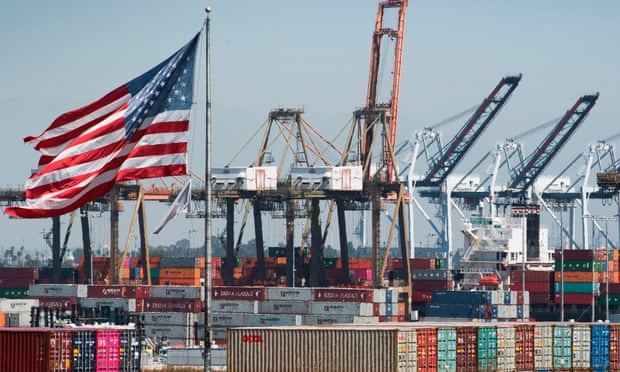
US trade deficit falls to three-year low in wake of China standoff
The gap between US imports and exports shrank to its lowest level in three years in November following a 15% decline in the country’s annual trade deficit with China.
A boost to US exports also improved the trade balance, fuelling concerns that Donald Trump will expand his campaign to squeeze the US trade deficit, which has so far focused on China, to include the EU and the UK.
The trade gap closed by 8.2% to $43.1bn (£32.9bn) in November, the Commerce Department said, down from $46.9bn in the previous month to register the lowest monthly deficit since October 2016.
US exports rose 0.7% during the month, while imports dropped 1%, helped by a slump in imports from China.
The US president is poised to sign a first stage trade deal with China next week, but will leave many tariffs in place to limit the supply of Chinese goods to the US market.
James Knightley, the chief international economist at ING bank, said Trump could be tempted to expand his tariff war to include the EU, which is expected to see its surplus with the US hit an all-time high for the whole of 2019.
“The EU [deficit] is on course to increase by $8bn,” he said. “Consequently, the EU is likely to remain nervous that President Trump could focus more of his attention on perceived European trade indiscretions in 2020.”
However, Andrew Hunter, a US economist at Capital Economics, said it was premature for Trump to declare victory because the narrowing of the trade gap could prove to be temporary. He said a decline in consumer goods imports was likely driven by US retailers selling stockpiled Chinese electronics purchased ahead of tariffs imposed in September. Once the stockpiles are exhausted, imports are expected to climb again.
A rupture to the Keystone oil pipeline, which caused a sharp yet short-lived fall in crude oil imports from Canada, also played a part in improving the November trade figures.
The annual trade deficit is also expected to be only marginally smaller than 2018’s total of $627.7bn, which had been a 14.1% jump over 2017, leaving the deficit over the US president’s first term much higher than the one he inherited from his predecessor.
Trade flows between the world’s two biggest economies have been disrupted over the past two years by the tit-for-tat trade war as both nations have first threatened and then pushed ahead with tariffs on the other nation’s products.
While the US trade deficit with China shrank, the deficit with Japan rose to $5.4bn in November while the deficit with the EU declined to $13.1bn.
Farewell to the 2010s…
… will the 2020s offer more hope? This has been a turbulent decade across the world – protest, populism, mass migration and the escalating climate crisis. The Guardian has been in every corner of the globe, reporting with tenacity, rigour and authority on the most critical events of our lifetimes. At a time when factual information is both scarcer and more essential than ever, we believe that each of us deserves access to accurate reporting with integrity at its heart.
More people than ever before are reading and supporting our journalism, in more than 180 countries around the world. And this is only possible because we made a different choice: to keep our reporting open for all, regardless of where they live or what they can afford to pay.
We have upheld our editorial independence in the face of the disintegration of traditional media – with social platforms giving rise to misinformation, the seemingly unstoppable rise of big tech and independent voices being squashed by commercial ownership. The Guardian’s independence means we can set our own agenda and voice our own opinions. Our journalism is free from commercial and political bias – never influenced by billionaire owners or shareholders. This makes us different. It means we can challenge the powerful without fear and give a voice to those less heard.
None of this would have been attainable without our readers’ generosity – your financial support has meant we can keep investigating, disentangling and interrogating. It has protected our independence, which has never been so critical. We are so grateful.
As we enter a new decade, we need your support so we can keep delivering quality journalism that’s open and independent. And that is here for the long term. Every reader contribution, however big or small, is so valuable.
